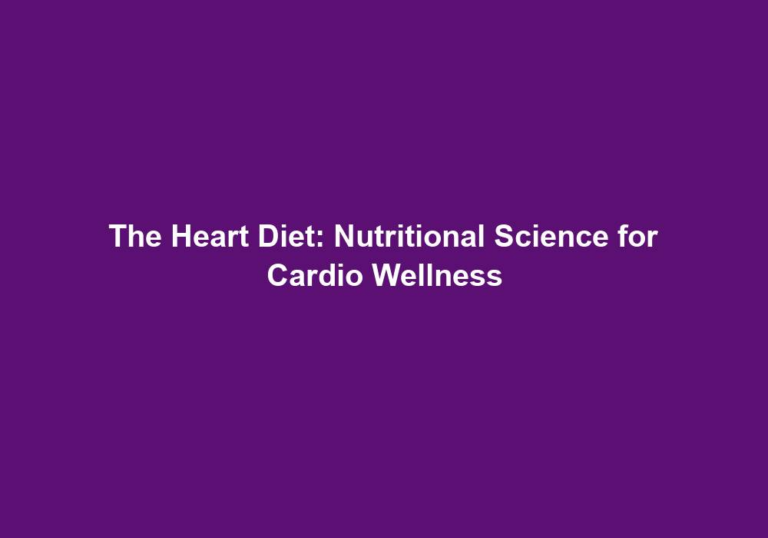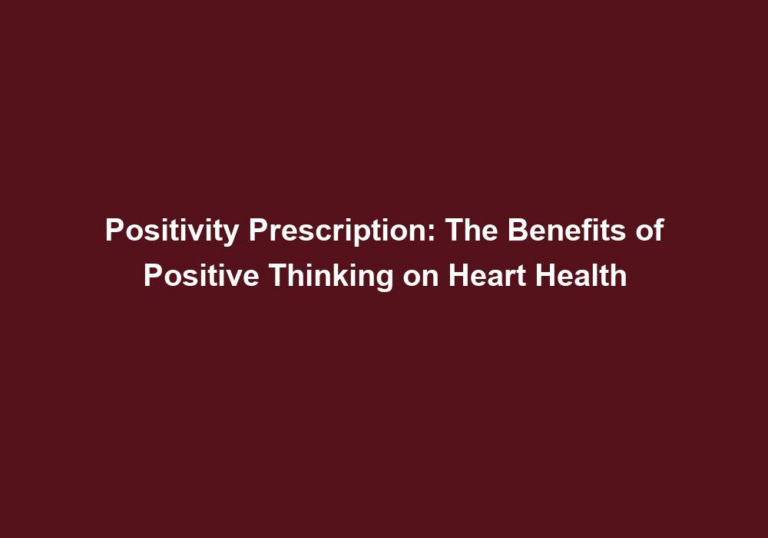Magnesium’s Heartfelt Benefits: What You Need to Know
Magnesium is an essential mineral that plays a vital role in numerous functions within the body. From supporting heart health to promoting proper muscle function, this often overlooked nutrient is crucial for maintaining overall well-being. In this article, we will delve into the heartfelt benefits of magnesium and explore why it is so important for our bodies.
The Role of Magnesium in Heart Health
Maintaining a Healthy Heart Rhythm:
- Magnesium is a key player in maintaining a healthy heart rhythm. It regulates the electrical impulses that control the rhythm of the heart, ensuring proper contraction and relaxation of the heart muscles. This helps to maintain a steady heartbeat, which is essential for overall cardiovascular health.
Lowering Blood Pressure:
- Studies have shown that magnesium supplementation can significantly reduce high blood pressure, a major risk factor for heart disease. Magnesium helps to relax and dilate blood vessels, improving blood flow and keeping blood pressure within a healthy range. By incorporating magnesium into your diet or considering supplementation, you can support your heart health and reduce the risk of hypertension.
Preventing Arrhythmias:
- Magnesium acts as a natural calcium blocker, inhibiting the influx of calcium into heart cells. This mechanism helps prevent abnormal heart rhythms or arrhythmias, which can be potentially life-threatening. By ensuring adequate magnesium intake, you can safeguard against these dangerous heart conditions.
Reducing the Risk of Heart Disease:
- Research suggests that higher magnesium intake is associated with a decreased risk of developing heart disease. This essential mineral promotes cardiovascular health by supporting proper heart function, improving blood flow, and reducing the risk of hypertension and arrhythmias. By prioritizing magnesium in your daily routine, you can take proactive steps towards maintaining a healthy heart.
Magnesium and Muscle Function
Muscle Relaxation:
- Magnesium plays a crucial role in the relaxation of muscles throughout the body, including the heart muscle. It helps prevent cramps and spasms by regulating the movement of calcium in and out of cells. By ensuring optimal magnesium levels, you can support muscle relaxation and reduce the risk of muscle-related issues.
Exercise Performance:
- Adequate magnesium levels are essential for optimal athletic performance. This mineral supports energy production, muscle contraction, and oxygen utilization, all of which are crucial for endurance, strength, and overall athletic performance. By incorporating magnesium-rich foods or considering supplementation, athletes can enhance their exercise performance and achieve their fitness goals.
Post-Workout Recovery:
- Magnesium is often referred to as the relaxation mineral due to its ability to calm the nervous system and reduce muscle tension. This makes it an excellent aid in post-workout recovery. By promoting muscle relaxation, reducing inflammation, and supporting the repair and growth of muscle tissue, magnesium can accelerate recovery and enhance overall exercise outcomes.
Other Health Benefits of Magnesium
Stress and Anxiety Relief:
- Magnesium is known for its calming properties, as it helps regulate neurotransmitters that influence mood and promote relaxation. Adequate magnesium levels can help reduce stress, anxiety, and even improve sleep quality. Incorporating magnesium-rich foods or supplementation can be beneficial for those seeking relief from stress and anxiety.
Bone Health:
- Magnesium works synergistically with other minerals, such as calcium and vitamin D, to maintain strong and healthy bones. It aids in calcium absorption and stimulates the hormone calcitonin, which helps preserve bone density and prevent osteoporosis. By ensuring sufficient magnesium intake, you can support bone health and reduce the risk of bone-related conditions.
Regulating Blood Sugar:
- Magnesium plays a role in insulin secretion and glucose metabolism, making it essential for maintaining healthy blood sugar levels. Studies have shown that low magnesium levels are associated with an increased risk of developing type 2 diabetes. By incorporating magnesium-rich foods or considering supplementation, individuals can support their blood sugar regulation and reduce the risk of diabetes.
Migraine Prevention:
- Research suggests that magnesium supplementation can help prevent migraines and reduce their frequency and intensity. It is believed to act by relaxing blood vessels and reducing inflammation in the brain. By ensuring adequate magnesium intake, individuals prone to migraines can potentially experience relief and improved quality of life.
How to Increase Your Magnesium Intake
Eat Magnesium-Rich Foods:
- Including foods like leafy green vegetables, nuts and seeds, legumes, whole grains, and fish in your diet can significantly boost your magnesium intake. These foods are excellent sources of magnesium and can help you meet your daily requirements. By diversifying your diet and incorporating these magnesium-rich foods, you can naturally increase your magnesium intake.
Consider Supplementation:
- If you struggle to meet your magnesium needs through diet alone, you may consider taking magnesium supplements. However, it is important to consult with a healthcare professional before starting any new supplement regimen. They can assess your specific needs and recommend the appropriate dosage and form of magnesium supplementation.
Avoid Magnesium-Depleting Factors:
- Certain factors, such as excessive alcohol consumption, high intake of caffeine or sugar, and chronic stress, can deplete magnesium levels in the body. By reducing or avoiding these factors, you can help maintain optimal magnesium levels and support your overall well-being.
Practice Stress-Reduction Techniques:
- As stress can deplete magnesium levels, incorporating stress reduction techniques like meditation, yoga, or deep breathing exercises can help support magnesium balance within the body. These techniques not only promote relaxation but also contribute to overall well-being.
In conclusion, magnesium is a vital mineral that plays a crucial role in heart health, muscle function, and overall well-being. From promoting a healthy heart rhythm to supporting athletic performance and reducing stress, the benefits of magnesium are truly heartfelt. By incorporating magnesium-rich foods, considering supplementation if necessary, and adopting a healthy lifestyle, you can ensure that you reap the numerous benefits that magnesium has to offer. So, prioritize your magnesium intake and take care of your heart and body!







